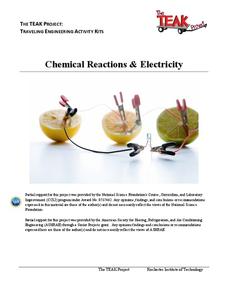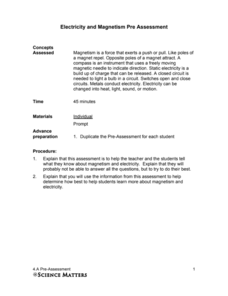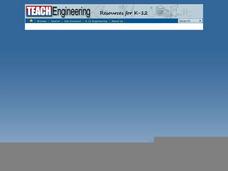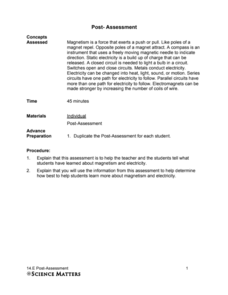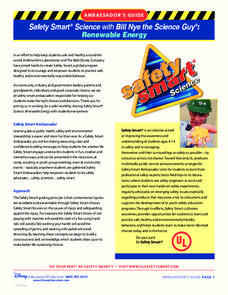Rochester Institute of Technology
Electrical Energy
My friend told me how electricity is measured and I was like Watt! In the hands-on activity, learners explore electricity by building circuits, both parallel and series. They also determine how increasing the number of light bulbs and...
Rochester Institute of Technology
Chemical Reactions and Electricity
After a discussion of chemical reactions and electricity, scholars break into groups and follow a scripted activity to discover if fruit can power a clock. After a concluding discussion, the class a presented with a challenge.
Science Matters
Electricity and Magnetism Pre-Assessment
How much do your classes know about electricity and magnetism? A complete elementary unit on the topic begins with a pre-assessment to gauge their understanding prior to instruction. Items include questions about the properties of...
Teach Engineering
Electricity and Magnetic Fields
Introduce your class to the idea of magnetic fields around electrical wires with an activity that provides the information about the direction of a magnetic field around a wire carrying an electric current.
University of Florida
The Magic School Bus and the Electric Field Trip
Energize a shared reading of the Magic School Bus and the Electric Field Trip with this collection of supplemental materials. Whether your looking for discussion questions, reading comprehension worksheets, or writing prompts, this...
Science Matters
Electricity and Magnetism Formative Assessment #2
Leave it to science to get scholars out of a jam. Young scientists use what they've learned about electricity and magnetism in the previous eight lessons in the series to build tools that will allow them to find their way out of the...
Wind Wise Education
Understanding Electric Power Generation
You mean the electricity does not come from the switch? As a class and in small groups, learners explore the sources of energy used to generate electric power. Worksheets guide groups into choosing a future electricity generating...
Science Matters
Electricity and Magnetism Formative Assessment #1
A formative assessment is a great tool for planning further instruction. The fifth lesson of a 14-part series exploring magnetism and electricity provides questions to gauge current understanding of magnetic fields, compasses, and forces...
Teach Engineering
Both Fields at Once?
An MRI uses both a magnetic and electricity, so how do the two interact with each other? Class members observe the effects on a charged particle when it is subject to both an electrical and magnetic field. The teacher background...
It's About Time
The Electricity and Magnetism Connection
Magnets don't grow in fields, but magnetic fields are important to understand. The lesson covers the effect electricity has on magnetic fields. Scholars use a compass, magnets, and electrical wire to test magnetic fields and energy...
Science Matters
Post Assessment: Magnetism and Electricity
Time to know what they know! The final installment of a 14-lesson unit assesses the class's understanding of magnetism and electricity concepts. Items include both multiple-choice and open-ended questions on magnetic fields, electric...
WindWise Education
How Does Energy Affect Wildlife?
Is wildlife affected the same way by different electricity generation methods? Teams work together to research four electricity generation sources and their impacts on wildlife. The teams create a summary report and share their findings.
Consumers Energy
Circuits and the Flow of Electricity Lesson Plan
I think I lost an electron. Are you sure? Yes, I'm positive! Starting with a hands-on demonstration and problem solving activity, young scientists define vocabulary related to circuitry and currents. Then they build their own circuits...
It's About Time
Electricity and Your Community
Young scientists read and interpret a data table about energy generation around the world. Next, they use the Internet to investigate energy generation in their own state, and, finally, pupils read a passage and answer questions about it.
Disney
Renewable Energy
Bring some energy to your physical science curriculum with this engaging Bill Nye the Science Guy activity. Based on his Renewable Energy video, students explore the concepts of potential and kinetic energy and learn how they are applied...
It's About Time
Building a Motor/Generator Toy
Combine science and playtime with the final lesson in an innovative unit. Scholars apply everything they have learned in previous lessons to build their own motors/generators and use it in a toy of their own design.
It's About Time
Force Fields
Young scholars investigate both bar and horseshoe magnets. They explore force fields with a compass and iron fillings before making an electromagnet. This is the first in a series of nine lessons.
WindWise Education
How Does a Generator Work?
I get a charge out of this. In order to learn how a generator works, groups build and test one in this ninth lesson of the series. The generators are tested at low speed and high speed to determine the watt output and whether they have...
Wind Wise Education
What is the Cost of Inefficiency?
What does it cost to keep the lights on? Through a hands-on activity, class members use a watt meter and determine the amount of energy different types of light bulbs use. The class then determines the financial and environmental cost of...
It's About Time
A Moving Frame of Reference
We often remind pupils to cite their references, but this lesson helps them understand there are many frames of reference. Scholars experiment with throwing a ball straight up in the air and catching it. Then they must do it again while...
Wind Wise Education
Understanding Forms and Sources of Energy
What is the difference between a form of energy and a source of energy? This first activity in a series of 19 lessons uses demonstrations and discussions to introduce energy to the class. Through using hand-generator flashlights,...
National Institute of Open Schooling
Chemical Thermodynamics
All chemical reactions require energy. To explore thermodynamics, classes read and discuss its laws, exothermic and endothermic reactions, enthalpy in many forms, calculate enthalpy problems, and use Hess' Law to calculate enthalpy of a...
Shelby County Schools
Atomic Structure Worksheet
Teaching young scientists about atoms is no small task, but this series of worksheets will make it a little easier. From creating and labeling Bohr models, to identifying information provided in the periodic table of elements, this...
Consumers Energy
The Cost of Electricity
How much is your toaster costing you every day? Young environmentalists calculate the monetary costs of household appliances based on their average consumption of wattage.



